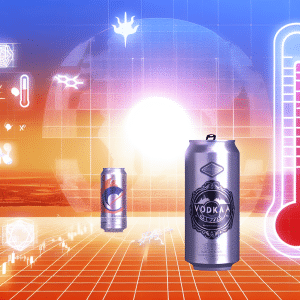High Noon Vodka Seltzer Faces Unusual Recall: What Investors Need to Know
In an unexpected twist in the booming ready-to-drink (RTD) alcohol market, High Noon—a leading vodka seltzer brand owned by E. & J. Gallo Winery—has issued a recall involving a packaging mix-up that could have far-reaching implications for consumers and investors alike.
Here’s the crux: Certain shipments of High Noon’s Beach Variety 12-packs were found to contain cans labeled as Celsius energy drinks but actually filled with High Noon’s alcoholic beverage. The mislabeled cans, specifically the Celsius Astro Vibe Sparkling Blue Razz Edition, were distributed across multiple states including Florida, Michigan, New York, Ohio, Oklahoma, South Carolina, Virginia, and Wisconsin. While no illnesses or injuries have been reported, the risk of unintentional alcohol consumption—especially by children or those abstaining for medical or religious reasons—is a significant safety concern.
This incident, traced back to a packaging supplier error, underscores a critical vulnerability in supply chain management for fast-growing brands in the RTD space. High Noon’s swift recall and refund offer is a necessary damage control measure, but the broader implications for brand trust and regulatory scrutiny cannot be overlooked.
Why This Matters to Investors
The RTD alcohol segment has been one of the hottest growth areas in the beverage industry, with High Noon among the fastest-growing brands. According to Nielsen data cited by Beverage Daily, the RTD category saw a 15% year-over-year sales increase in 2023, driven by consumer demand for convenient, flavorful alcoholic beverages. However, incidents like this recall serve as a cautionary tale: rapid expansion often strains operational controls, exposing companies to reputational and financial risks.
From an investment perspective, this recall highlights the importance of scrutinizing supply chain resilience and quality assurance protocols in portfolio companies. Investors should ask: How scalable and robust are these companies’ operational frameworks? Are they prepared to handle the complexities of increased volume without compromising safety?
Actionable Insights for Advisors and Investors
-
Monitor Supply Chain Transparency: Investors should prioritize companies that provide clear visibility into their sourcing and packaging processes. Transparency isn’t just good governance—it’s a competitive advantage in a crowded market.
-
Evaluate Crisis Response Plans: The ability to respond quickly and effectively to product issues can mitigate long-term damage. High Noon’s immediate recall is positive, but investors should assess whether a company’s crisis management strategies are proactive rather than reactive.
-
Consider Regulatory Trends: The FDA and other regulatory bodies are increasingly vigilant about labeling accuracy and consumer safety. Expect more rigorous inspections and potential fines, which could impact margins and stock performance.
-
Diversify Within RTD and Adjacent Markets: While RTD alcohol remains promising, diversifying exposure to adjacent sectors like non-alcoholic beverages or functional drinks (e.g., energy, wellness) can hedge against category-specific risks.
A Unique Angle: The Impact on Brand Loyalty
One underappreciated risk in such recalls is the erosion of brand loyalty. RTD consumers often choose brands based on convenience and perceived quality. If a consumer accidentally ingests alcohol due to mislabeling, the trust breach could lead to long-term brand damage. This is particularly critical for younger demographics, who are increasingly health-conscious and brand discerning.
What’s Next?
For High Noon and similar brands, investing in advanced packaging technologies—such as tamper-evident seals and blockchain-based supply chain tracking—could become essential. These innovations not only enhance safety but also provide marketing differentiation in an increasingly competitive field.
In conclusion, while the recall is a hiccup for High Noon, it serves as a broader wake-up call for investors: growth in emerging beverage categories must be balanced with operational excellence and risk management. Those who navigate this balance successfully will be best positioned to capitalize on the RTD boom’s long-term potential.
For investors looking to stay ahead, now is the time to deepen due diligence on supply chain integrity and crisis preparedness in their beverage portfolios. The next wave of winners won’t just be the trendiest brands—they’ll be the ones who master the art of safe, scalable growth.
Sources:
- U.S. Food and Drug Administration (FDA) recall announcement
- Nielsen data via Beverage Daily on RTD alcohol sales growth
- Industry insights from Bloomberg and CNBC Pro
Stay informed, stay strategic, and keep your portfolio ready for the next shake-up in the beverage world.
Source: High Noon recalls vodka seltzers in Celsius cans

